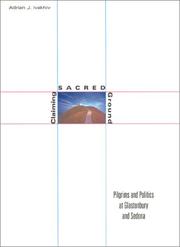| Listing 1 - 3 of 3 |
Sort by
|
Book
ISBN: 1554589061 9781554589050 1554589053 9781554589067 9781554589074 155458907X Year: 2013 Publisher: Waterloo, Ontario, Canada : Beaconsfield, Quebec : Wilfrid Laurier University Press, Canadian Electronic Library,
Abstract | Keywords | Export | Availability | Bookmark
 Loading...
Loading...Choose an application
- Reference Manager
- EndNote
- RefWorks (Direct export to RefWorks)
"Moving images take us on mental and emotional journeys, over the course of which we and our worlds undergo change. This is the premise of Ecologies of the Moving Image, which accounts for the ways cinematic moving images move viewers in ways that reshape our understanding of ourselves, of life, and of the Earth and universe. This book presents an ecophilosophy of the cinema: an account of the moving image in relation to its lived ecologies--the material, social, and perceptual relations within which movies are produced, consumed, and incorporated into cultural life. Cinema, Adrian Ivakhiv argues, lures us into its worlds, but those worlds are grounded in a material and communicative Earth that supports them, even if that supporting materiality withdraws from visibility. Ivakhiv examines the geographies, visualities, and anthropologies--relations of here and there, seer and seen, us and them, human and inhuman--found across a range of styles and genres, from ethnographic and wildlife documentaries to westerns and road movies, and from sci-fi blockbusters and eco-disaster films to the experimental and art films of Tarkovsky, Herzog, Greenaway, Malick, Dash, and Brakhage as well as YouTube's expanding audiovisual universe. Through its process-relational account of cinema, drawn from philosophers such as Whitehead, Peirce, and Deleuze, the book boldly enriches our understanding of film and visual media."--Publisher's website.
Motion pictures -- Philosophy. --- Motion pictures -- Psychological aspects. --- Motion pictures -- Social aspects. --- Music, Dance, Drama & Film --- Film --- Motion pictures --- Nature in motion pictures. --- Ecology in motion pictures. --- Cinéma --- Naturfilm. --- Naturen i filmen. --- Ekologi i filmen. --- Ekokritik. --- Film. --- Philosophy. --- Aspect social. --- Aspect psychologique. --- Philosophie. --- Social aspects. --- Psychological aspects. --- Ecocriticism. --- Ecophilosophy. --- Film studies. --- Film-philosophy. --- Peirce. --- Whitehead.
Book
ISBN: 9781947447882 1947447882 Year: 2018 Publisher: Earth, Milky Way ; [Brooklyn, NY] : punctum books,
Abstract | Keywords | Export | Availability | Bookmark
 Loading...
Loading...Choose an application
- Reference Manager
- EndNote
- RefWorks (Direct export to RefWorks)
A spectre is haunting humanity: the spectre of a reality that will outwit and, in the end, bury us. “The Anthropocene,” or The Human Era, is an attempt to name our geological fate – that we will one day disappear into the layer-cake of Earth’s geology – while highlighting humanity in the starring role of today’s Earthly drama. In Shadowing the Anthropocene, Adrian Ivakhiv proposes an ecological realism that takes as its starting point humanity’s eventual demise. The only question for a realist today, he suggests, is what to do now and what quality of compost to leave behind with our burial. The book engages with the challenges of the Anthropocene and with a series of philosophical efforts to address them, including those of Slavoj Žižek and Charles Taylor, Graham Harman and Timothy Morton, Isabelle Stengers and Bruno Latour, and William Connolly and Jane Bennett. Along the way, there are volcanic eruptions and revolutions, ant cities and dog parks, data clouds and space junk, pagan gods and sacrificial altars, dark flow, souls (of things), and jazz. Ivakhiv draws from centuries old process-relational thinking that hearkens back to Daoist and Buddhist sages, but gains incisive re-invigoration in the philosophies of Charles Sanders Peirce and Alfred North Whitehead. He translates those insights into practices of “engaged Anthropocenic bodymindfulness” – aesthetic, ethical, and ecological practices for living in the shadow of the Anthropocene.
Geology, Stratigraphic --- Nature --- Philosophical anthropology. --- Environmental psychology. --- Effect of human beings on --- Cognitive ergonomics --- Ecological psychology --- Ecopsychology --- Ecotherapy --- Environmental quality --- Environmental social sciences --- Human factors science --- Psychoeology --- Psychology --- Psychotherapy --- Ecological Systems Theory --- Anthropology, Philosophical --- Man (Philosophy) --- Civilization --- Life --- Ontology --- Humanism --- Persons --- Philosophy of mind --- Age of rocks --- Rocks --- Stratigraphic geology --- Physical geology --- Psychological aspects --- Philosophy --- Age

ISBN: 1282065874 9786612065873 0253108381 9780253108388 9781282065871 6612065877 0253338999 9780253338990 Year: 2001 Publisher: Bloomington : Indiana University Press,
Abstract | Keywords | Export | Availability | Bookmark
 Loading...
Loading...Choose an application
- Reference Manager
- EndNote
- RefWorks (Direct export to RefWorks)
Claiming Sacred GroundPilgrims and Politics at Glastonbury and SedonaAdrian J. IvakhivA study of people and politics at two New Age spiritual sites.In this richly textured account, Adrian Ivakhiv focuses on the activities of pilgrim-migrants to Glastonbury, England and Sedona, Arizona. He discusses their efforts to encounter and experience the spirit or energy of the land and to mark out its significance by investing it with sacred meanings. Their endeavors are presented agains
New Age movement --- Sacred space --- Holy places --- Places, Sacred --- Sacred places --- Sacred sites --- Sacred spaces --- Sites, Sacred --- Space, Sacred --- Holy, The --- Religion and geography --- Aquarian Age movement --- Cults --- Social movements --- Occultism --- Sedona (Ariz.) --- Glastonbury (England) --- Sedona, Ariz. --- Glastonbury, Eng. --- Glastonbury (Somerset) --- Religion.
| Listing 1 - 3 of 3 |
Sort by
|

 Search
Search Feedback
Feedback About UniCat
About UniCat  Help
Help News
News